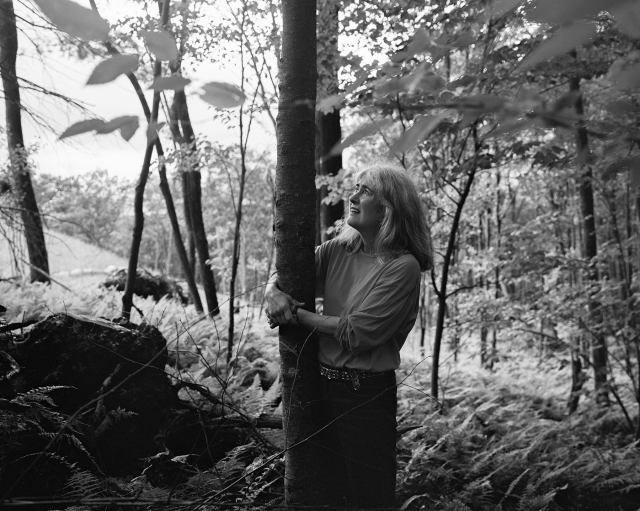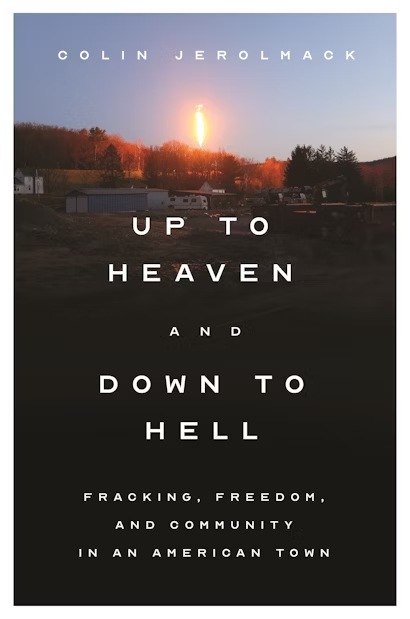Whenever Earth Day rolls around, I think about Cindy Bower, one of the most dedicated environmentalists I know. When I first met her, in 2013, the silver-haired sexagenarian reminisced about carrying signs for the first Earth Day, many Aprils ago, in 1970. As we sipped coffee in her sunroom, looking out upon the sloping fields and dense forest of her bucolic estate in Pennsylvania’s Appalachian foothills, Cindy lamented that the degradation of the planet, driven by what she called our “addiction” to fossil fuels, has only worsened since then.
For Cindy, the issue was not abstract: Over the last several years, she watched as fracking, the process of extracting natural gas and oil from shale rock thousands of feet underground, transformed her sleepy hamlet of Trout Run into a gritty industrial park. At the time we spoke, within a quarter-mile of her house, earth-movers had leveled the side of a mountain to build a well pad, two massive drilling rigs were operating around the clock, pipeline right-of-ways had scarred a forested tract of state game land, tractor trailer caravans were snarling traffic and pulverizing the road, and a 50-foot plume of fire was shooting out of a flare stack.
Cindy was doing her part to protect the region’s natural heritage. She helped an environmental organization wage a lawsuit alleging that Pennsylvania’s leasing of public forests for shale gas drilling violated residents’ constitutional right to the preservation of the natural environment. And she and her husband placed a conservation easement on their 150-acre estate, ensuring that it would remain pristine in perpetuity. But Cindy was powerless to stop the “noise, the light pollution, and the smells” of industry—the aggregate result of her neighbors’ decision to lease their land for gas drilling—from trespassing on her Eden.
***
Of all the landowners I befriended while living in Williamsport, PA (home of the Little League World Series) and researching fracking, Cindy was the last one I expected to lease their property’s mineral rights to an energy company. But eventually she did—albeit with significant environmental restrictions, most notably a clause that the company couldn’t disturb the surface of her land (it could only horizontally drill underneath). Cindy admitted that she didn’t need the money. Rather, she saw the leasing bonus as compensation for the quality-of-life and environmental disturbances she had already endured for years because of her neighbors’ decision to lease their land. Besides, she concluded that holding out hadn’t slowed the pace of fracking in the area; everyone around her leased. “I’m not gonna be a martyr for this,” she resolved.
The social dynamic propelled by fracking echoes what the controversial ecologist Garrett Hardin famously called the “tragedy of the commons”: a situation in which people are compelled to behave selfishly, even if they know that doing so is contrary to the common good and degrades shared resources like air or water. They act this way because they know their self-sacrifice will have no effect unless everyone else behaves unselfishly as well. “If they could have guaranteed me that … any possible contamination stops at the property line, that my property would never be affected, I wouldn’t have leased,” Cindy reasoned. Her neighbors applied the same logic: they would share some of the environmental costs of others’ decision to lease no matter what, so they might as well lease and make some money.
It’s facile to frame the tragedy of the commons associated with land leasing as an inevitable result of incorrigible human selfishness, as Hardin might. The fact that even a well-to-do environmentalist felt compelled to betray her principles points to a structural problem, not personal failings. As I argue in my book, Up to Heaven and Down to Hell: Fracking, Freedom, and Community in an American Town, Cindy’s dilemma is the product of a uniquely American legal and political arrangement that constitutionally enshrines—and grants preeminence to—subsurface mineral ownership and thwarts community resource management.
***
The United States is the only country in the world where private citizens own the majority of the subsurface and are granted the exclusive right to mine it for gas and oil—and profit from it. According to common-law “freehold” property rights, “Whoever owns the soil, it is theirs up to heaven and down to hell.” This legal regime puts the onus of underground mining decisions on individual property owners, who must act as their own actuaries. What’s more, it routinely fails to hold lessors—let alone oil and gas companies—responsible for most of the spillover effects that neighbors, and the planet, must absorb from fracking on leased land. Petroleum companies don’t pay for the greenhouse gas emissions produced from fracking. Oil and gas extraction is exempt from the Clean Water Act, which means that the Environmental Protection Agency effectively relegates regulatory authority over fracking to the states. In 2020, a Pennsylvania grand jury investigation concluded that the state Department of Environmental Protection didn’t do enough to “properly protect” residents’ “health, safety and welfare” and was so loath to prosecute industry malfeasance that the jury suggested vesting that authority with the attorney general.
Although there’s a vigorous national debate in the US about the promises and perils of fracking, there was never a collective referendum about whether exploiting shale gas and oil is in the public interest. In most countries, the government retains the mineral rights (only the surface can be privately owned) and decides whether developing them benefits the commonwealth, often with input—if not votes—from its citizens. But because of the peculiar nature of American property rights, this incredibly momentous decision about the wellbeing of our communities and our planet—to frack or not to frack—is largely a series of private choices that thousands of solitary landowners located atop shale deposits make without their neighbors’ or society’s consent. (Despite environmentalists’ wishes, president Biden can’t ban fracking on privately held land). The ironic consequence is that the legally protected freedom to exploit one’s mineral rights erodes the freedom of others—their right to be left alone, and their sovereignty over their estate.
Some communities have attempted to balance property rights and the public good by creating their own municipal restrictions, or even bans, on certain kinds of oil and gas infrastructure—only to be sued by their own state governments, which claim sole jurisdiction over the industry. Colorado, Texas, Pennsylvania, and other oil- and gas-producing states have passed statutes that preempt local zoning and require towns to allow fracking even in residential and agricultural zones (where other industries are usually not allowed). A Pennsylvania judge called zoning “the purest voice of the people’s desires and interests.” But with elected township supervisors, city councilmembers, and county commissioners stripped of their customary “home rule” authority to regulate the spread of industry, community members have lost a say in land-use decisions that directly affect them. Fracking, then, isn’t just bad for the planet. It’s bad for democracy.
Colin Jerolmack is professor of sociology and environmental studies at New York University and the author of The Global Pigeon. He lives in New York City. Twitter @jerolmack

